Below are some featured articles from our award-winning magazine for your reading pleasure!
LACPA members may view the current and past issues of The Los Angeles Psychologist, at the Current and Past Issues tab.
(You will need to sign in to the Website to gain full access.)
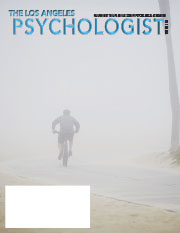
2025 Winter Issue of
The Los Angeles Psychologist
Expanding Mental Health Access Through Culturally Responsive AI: Opportunities and Boundaries for Supporting Individuals with Anxiety
Aprill Baker-Griffin, LMFT, Ph.D., and Wendy Ashley, Psy.D., LCSW
Click Here to Read the Full Article
"Artificial intelligence (AI) offers innovative approaches to mental health support, but its effectiveness and ethical application require attention to cultural responsiveness and inclusion. Insight into the psychological and media-based dynamics that shape user experiences with AI tools is essential to understanding how individuals interact with AI mental health platforms, and how to use them effectively." (Baker-Griffin and Ashley, 2025)
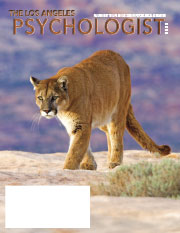
2025 Fall Issue of
The Los Angeles Psychologist
Empowering Change: The Essential Role of Legislative Advocacy in California’s Behavioral Health Care
Meron Agonafer
Click here to read the full article
On a broader level, legislative advocacy can initiate systemic changes in the behavioral health care system. Staying informed and actively participating enables advocates to secure funding for voluntary, community-based services and invest in evidence-based programs that meet the needs of Californians, rather than expanding involuntary treatment options. Let us be the agents of change. (Agonafer, 2025)
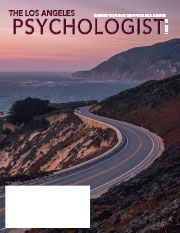
2025 Summer Issue of
The Los Angeles Psychologist
Opinion: Challenging The Myth of Sex Addiction
Marty Klein, Ph.D
Click here to read the full article
"So, the diagnosis of sex addiction is in many ways a diagnosis of “discomfort with one’s own sexuality,” or “at odds with cultural definitions of normal sex, and struggling with that contrast.” A sex-negative culture like America breeds that contrast and discomfort. Calling these symptoms of “sex addiction” entirely omits the role that sex-negative culture plays in shaping people’s distress with their sexuality, which they often channel into repetitive behavior (whether satisfying or not) that can be hard to fathom."
(Klein, 2025)
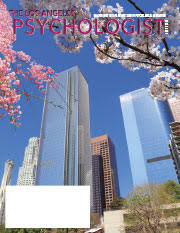
2025 Spring Issue of
The Los Angeles Psychologist
Demystifying Psychiatric Medications:
A Therapist's Guide to Effective Collaborations, Referrals, and Side Effects.
Kathleen McDermott, PMHNP
Click here to read the full article
"Therapists who are knowledgeable about psychiatric medications can support the therapeutic process in several ways. Integrating an understanding of pharmacology with psychotherapy ensures that the two treatment approaches are aligned, leading to more effective care. Additionally, therapists who dispel clients’ myths and misconceptions—such as fears of dependence or personality changes—empower them to make informed decisions (Pillinger et al 2023)."
(McDermott, 2025)
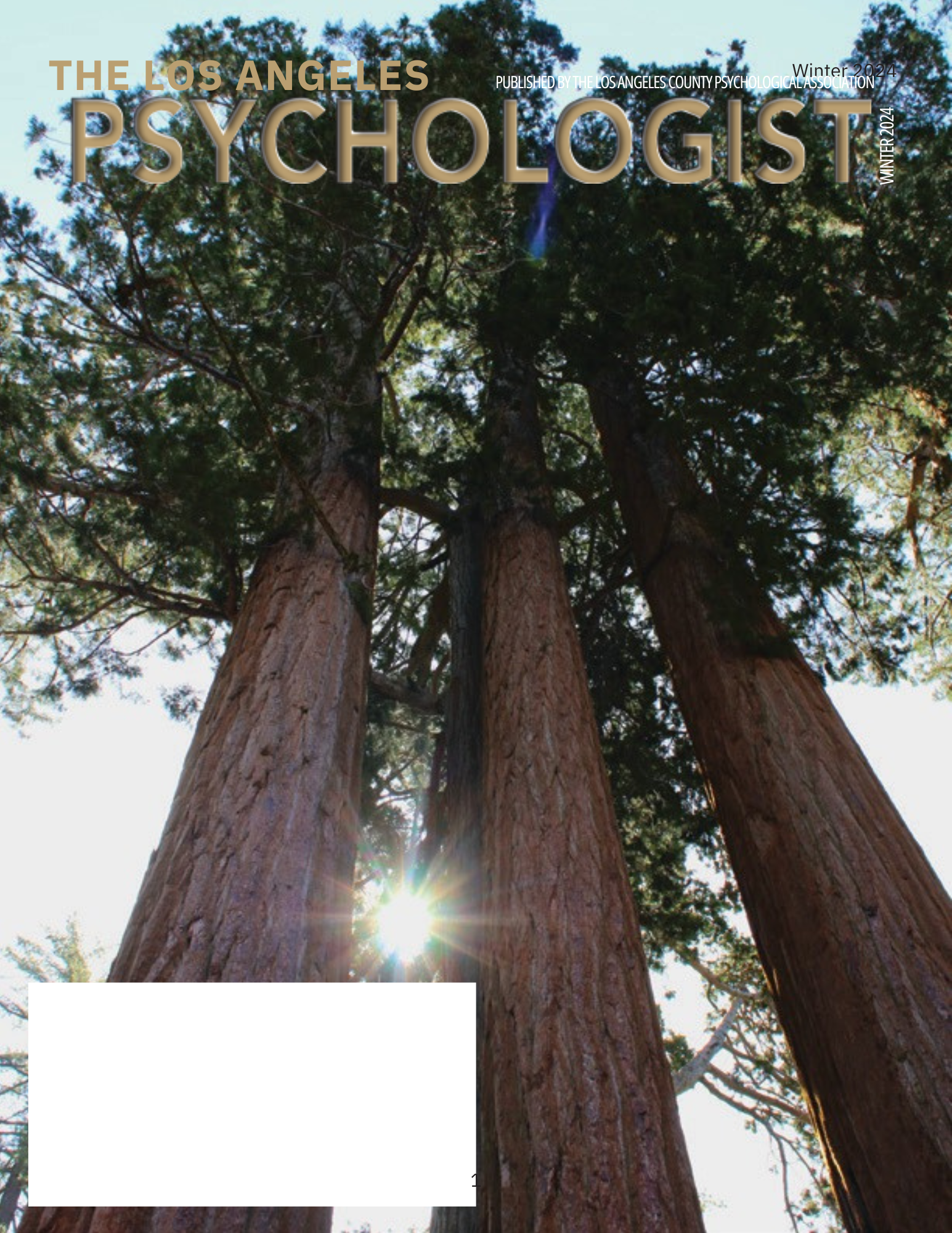 2024 Winter Issue of 2024 Winter Issue of
The Los Angeles Psychologist
Is Autism the Price for a Human Brain?
Temple Grandin, Ph.D.
Click here to read the full article
"The same genetic mechanism that makes humans have a large brain may be the same genes that cause autism and schizophrenia. Researcher J.M. Sikela, at the Colorado School of Medicine and V.B. Searles at the University of California, have found that copy number variation in the chromosome locus 1q21 may cause both autism and schizophrenia." (Grandin, 2024)
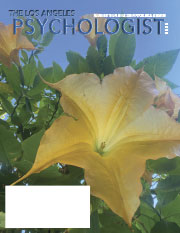 2024 Fall Issue of 2024 Fall Issue of
The Los Angeles Psychologist
Racism in Counseling and Psychotherapy: Eight Potential Biases
By Derald Wing Sue, Ph.D.
Click here to read the full article
"To understand how therapeutic practice, professional standards, prescribed treatment modalities, and diagnostic formulations may channel racial biases, we need to understand the far-reaching definition of cultural racism that is inherent in the broader societal context." (Sue, 2024)
 2024 Summer Issue of 2024 Summer Issue of
The Los Angeles Psychologist
The Only Way to Win is Not To Play: A Post-Divorce Case Study
By David J. Glass, J.D., Ph.D.
Click Here to Read the Full Article
"Donald, with some excellent therapy, also was able to separate his own view of himself and his abilities from the opinions of others, most significantly his ex-wife. He gradually became more confident in other social situations. Donald’s children enjoyed the active role in their own life decisions that their father offered them, and the children learned by observation that they, too, could sometimes avoid their mother’s emotional outbursts by “refusing to play the game.” (Glass, 2011, 2024)
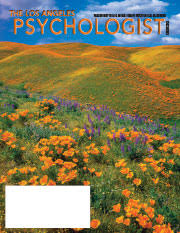 2024 Spring Issue of 2024 Spring Issue of
The Los Angeles Psychologist
Changing Perspectives on Autism: An Interview with Barry M. Prizant, Ph.D., CCC-SLP
by Daniel Franklin, Ph.D.
Click here to read the full article
"The whole category of autism has expanded in a number of ways. One of the reasons we are seeing so many late-diagnosed and self-diagnosed people is that there are many people who, either through their own masking, or just having a better ability to deal with some of the challenges of autism, will pass as not being autistic. We certainly see people who are more capable and whose language is much more sophisticated. Many people who are diagnosed on the spectrum and some self-diagnosed people live a fairly successful life with minimal support. In other cases, they are capable of making decisions about their support needs. I think that's the first way that things have really changed: the spectrum is much broader, which in part explains why it seems that there are so many more autistic people." (Prizant, 2024)
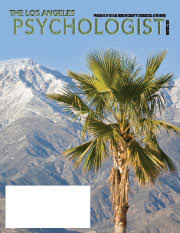
2023 Winter Issue of
The Los Angeles Psychologist
Leaders in the Anti-Racist and Anti-Oppressive Organization Movement:
An Interview with Henry “Enrique” Ortiz, Psy.D. and Shannon Magnis, Ph.D., CGP
Click Here to Read the Full Article
"The anti-racist and anti-oppressive organization supports the empowerment of people of color. The organization takes the initiative, shares in the power, and changes organizational norms and cultures. Such an organization makes sure that all of its members participate in decisions about how the organization's resources will be allocated, what work will be done, and how it will be done. Importantly, such an organization allows people of color to make the same mistakes as white people. The organization offers training and promotes conversations about racism, white privilege, power, and accountability, setting clear standards for inclusion at all levels of the organization. Such an organization also makes sure to periodically review the mission, vision, policies, procedures, Board agreements, etc. to ensure that the commitment to end racism and oppression is a consistent theme." (Ortiz, Magnis, 2023)
2023 Fall Issue of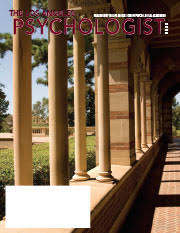
The Los Angeles Psychologist
“Above All, Do No Harm:” Serving the Population’s Growing Climate Distress
Debra S. Borys, Ph.D., FABPS
Click Here to Read the Full Article
"Ecopsychology as an area of specialization was first recognized by APA in the early 1980s, along with the formation of Division 34 (Society for Environmental, Population and Conservation Psychology). A meaningful literature of peer-reviewed research and innovative, empirically-studied, problem-specific psychological interventions for climate distress is expanding, and familiarity and experience with this body of work can enable clinicians to
become competent to treat affected patients." (Borys, 2023)
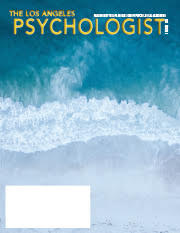 2023 Summer Issue of 2023 Summer Issue of
The Los Angeles Psychologist
From CE to CPD, Part Two
David Laramie, Ph.D.
Click Here to Read the Full Article
"No doubt it will take some time to get accustomed to the new system. However, in the long run it will offer more variety and choice and is intended to improve everyone’s learning and clinical work. As always, LACPA will support you along the way." (Laramie, 2023)
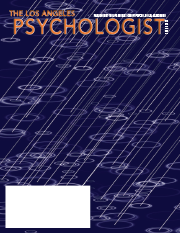
2023 Spring Issue of
The Los Angeles Psychologist
Sociocultural Considerations in Mindfulness and Self-Compassion Interventions
Shelly P. Harrell, Ph.D., Bemi Fasalojo, M.A., and Jordyne James, M.A.
Click Here to Read the Full Article!
"So, what does it mean to consider sociocultural issues in our psychological practice? Broadly, this means that the development and implementation of our interventions pay consistent and comprehensive attention to four intersecting elements: multicultural, socioecological, sociopolitical, and sociohistorical."
(Harrell et al. 2023)
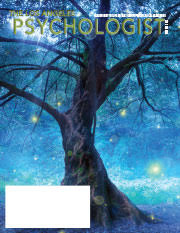
2022 Winter Issue of
The Los Angeles Psychologist
From CE to CPD,
Breaking Down the New BOP Requirements
David Laramie, Ph.D
Click Here to Read the Full Article!
"Therefore, the traditional language and structure of Continuing Education has been replaced by the new system of Continuing Professional Development (CPD). Psychologists will still need to complete 36 hours of CPD every two years. Importantly, only 27 hours of traditional CE classes can be counted, and the rest must draw on the three newly created learning categories. These other categories are Professional Activity, Academic, and Board Certification. Taken together, there are now 15 different ways to get your CE units." (Laramie, 2022)
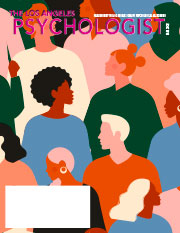
2022 Fall Issue of
The Los Angeles Psychologist
Advocating for Marginalized, Neurodivergent Children
from a Socially Responsible Neuropsychology Framework
Vindia G. Fernandez, Ph.D. and Albert Miranda, Psy.D.
Click Here to Read Full Article!
"In short, equitable care often requires making choices that are uncomfortable, impractical, and unprofitable, but neuropsychological assessment is primed for a paradigm shift. Although the growing momentum for greater representation and inclusion of neurodivergent and culturally diverse populations may be slow, we are better equipped now to treat those who are most vulnerable, and we are even more committed to mitigating the harm that traditional practices have caused." (Fernandez & Miranda, 2022)
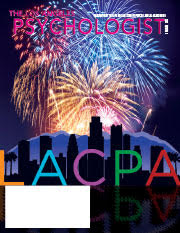
2022 Summer Issue of
The Los Angeles Psychologist
Addressing Weight Stigma
Lauren Muhlheim, Psy.D.
Click Here to Read the Full Article!
"What is your reaction when “overweight clients” walk into your office? Do you make assumptions about their eating habits? Do you assume they are binge eaters? Assumptions based on body size have permeated our culture and our therapeutic literature. There have always been fat people. A person’s body size cannot tell you what their eating habits are. The “psychotherapeutic” trope that people “hold on to fat” to protect themselves is unfounded. And finally, focusing on helping clients lose weight may be harmful." (Muhlheim, 2022)

2022 Spring Issue of
The Los Angeles Psychologist
Death Shall Have No Dominion: Double Talk
Albert Morell, Ph.D.
Click Here to Read the Full Article!
"As a result, traditional psychological systems overtly purported to excise the centuries-old ghost-in-the-machine sciences, and replace them with their own, inclusive of Freud and his psychoanalytic circle, many of whom were engaged in esoteric research and practice, evidenced by Freud’s clandestine immersion in spiritism and parapsychological research, and his own doppelgänger experiences, which he feared were harbingers of death. Freud’s interest in parapsychological phenomena may explain his compulsion to write The Interpretation of Dreams, and his thwarted desire later to wed parapsychology to psychoanalysis." (Morell, 2022)
|






 2024 Fall Issue of
2024 Fall Issue of 2024 Summer Issue of
2024 Summer Issue of 2024 Spring Issue of
2024 Spring Issue of 






